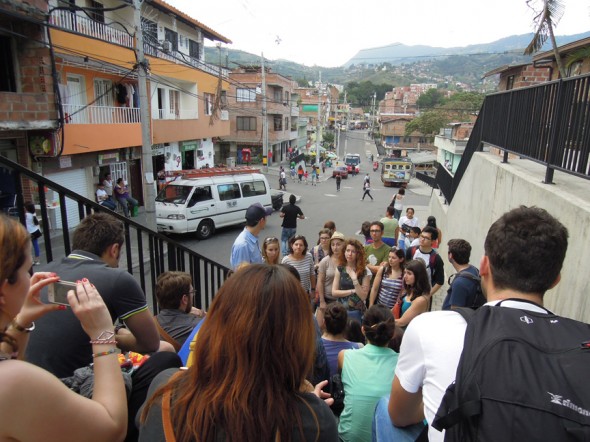
Students visiting Comuna 8 with representative of the Urban Development Enterprise of the Municipality of Medellín. Photo: Allison Koornneef, 2013.
We are proud to present a new article co-authored by our co-director Carmen Mendoza published in the journal Current Opinion in Environmental Sustainability on Enabling community-higher education partnerships, specifically with reference to our International Planning Studio, ‘Rethinking Urban Fringes in Medellín: An Alternative Intervention Model’ organized in 2013 in collaboration with the National University of Colombia (UNC), Columbia University (CU), and the Community Planning Council of Commune 8 (CPCC8).
The paper “offers an open reflection from local community representatives, students, and professors from diverse institutional and geographic settings on a joint experience in an international, community-higher education planning studio that focused on analyzing and proposing alternatives to a greenbelt project conceived as a mechanism to contain urban growth while controversially causing the relocation of dwellers of the self-built ‘Commune 8’ located in Medellín, Colombia.”
Mr. Mayor: presenting a project is not constructing it with the community. We demand respect. Photo: Catalina Ortiz Arciniegas, 2013.

March through the informal settlement ‘Comuna 8’ for the ‘right to remain in the territory’ vis-à-vis the greenbelt proposal. Photo: Catalina Ortiz Arciniegas, 2013.
The article offers different perspectives on the motivation for establishing these kinds of partnerships, approaches to community engagement, protocols for knowledge transfer, challenges for community-higher education partnerships, and future visions and direction, with open reflections by the main participants of the partnership, including that of community leaders, professors and students, too:
The most meaningful part of the experience was getting to interact personally with residents and activists of the community. I was extremely impressed by the organization, complexity, and completeness of the community proposals for the Greenbelt project. The community showed the power of political will and desire regardless of formal education or technical tools. The document that was produced and the subsequent protest actions, to me, reinforce the notion that in many cases the community does actually know what is best for itself. – Giselle Sebag (Class of 2012-13)
Congrats to all the authors for a great contribution on best practices to the field!

